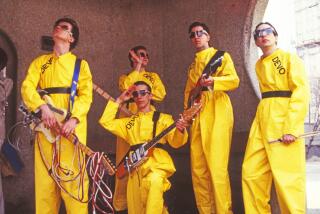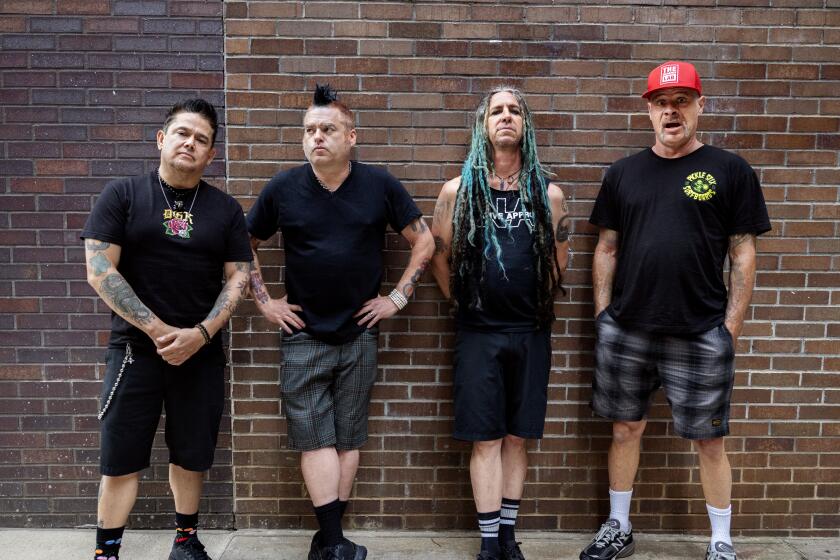IRISH BAND’S CHOICE: HEAT OR MUSIC
Demo tapes. Every band that ever got signed to a contract has a stack of early recordings back home in the closet, most of which are hidden out of embarrassment. But Ireland’s Cactus World News--which makes its local debut tonight at the Whisky--may take the cake for the strangest collection of homemade cassettes.
It seems that in Dublin, some quarters are equipped with pay-as-you-go electricity meters--like the one installed in guitarist Frank Kearns’ one-room apartment. And in the dead of winter, with money running low, the band sometimes had to pick either music or heat, even during crucial rehearsals and taping sessions.
“We had to make this choice between turning on the little seven-watt amplifiers we had, or the electric fire,” recalled Kearns at the band’s Hollywood hotel this week.
“We had no money. We’d given up everything for this, and it was desperation hour. It’s very hard for people here to comprehend this, but when you use the meter, you put 50 pence apiece in and switch it on and it goes for about half an hour--and if you’re using more electricity, it only goes for 20 minutes.”
Added singer Eoin McEvoy: “We have cassettes of these recordings where the power goes off in the middle of the song, and you can hear someone’s feet running to go put more money in. They’re really funny.”
On one of those most chilly and desperate days, Cactus World News was improvising and worked up a song called “The Bridge”--very quickly, before the meter ran out. “It was a race against time,” said Kearns.
The risk that day proved to be worth it--instead of pneumonia, the band got a record contract after the resulting tape of “The Bridge” ended up in the hands of U2’s Bono Hewson, an old friend from Dublin.
Hewson liked the song enough to not only make it the first release on Mother Records--a new label financed by U2 to showcase new Irish bands--but to produce it himself, something he’d never tried before.
“We couldn’t believe that he had that faith in the song at the time,” recalled Kearns. “And we started saying things--’Well, it would be nice having you produce it, Bono, but what about all these comparisons and all the (backlash) we’re gonna get from people who think it’s Bono’s best mates?’
“And he said, ‘Look, I’m proud of this song, you should be proud of this song, and it’s gonna stand up on its own merits.’
“Still, we were so paranoid that we didn’t even want to put Bono’s name on the sleeve.”
That original three-song recording on the Mother label is now out of print and highly coveted by fans. The group has its first full-length album out on MCA, however, titled “Urban Beaches.”
Hewson had nothing to do with the production on this one (“The Bridge” was re-recorded with a new producer), and this time neither he nor anyone else in U2 is thanked by name on the album packaging.
“The stories get totally out of hand,” said McEvoy, bemoaning the drawbacks of the U2 connection. “We actually saw in print once that Bono put the band together. Generally speaking, it’s a help, though.”
College radio has jumped on the band with enthusiasm, but critical reaction has been mixed, with some suggesting that Cactus World News sounds just a little too much like its supposed mentor, with the heavy reverb on the guitar and rather vague lyrics and whatnot.
Not surprisingly, the comparisons are not something the band particularly looks forward to. “It’s partly because we come from Dublin City,” said Kearns, “and who else comes from Dublin City, you know?”
“Like any band, we don’t want to sound like anyone else,” added McEvoy. “Rock ‘n’ roll is almost 30 years old, it’s gone through a couple of cycles, and here we are now, where I think anybody can be themselves in music. You don’t have to be something that you’re not.
“That’s what brought me into music six or seven years ago, when I finally realized that some of the acts I was watching at the time were being themselves --and they couldn’t have done that 10 years before.
“Now it doesn’t matter what you look like or where you come from; there’s room for you, and it’s up to you how much you maintain it and how much you communicate with people.”
More to Read
The biggest entertainment stories
Get our big stories about Hollywood, film, television, music, arts, culture and more right in your inbox as soon as they publish.
You may occasionally receive promotional content from the Los Angeles Times.










